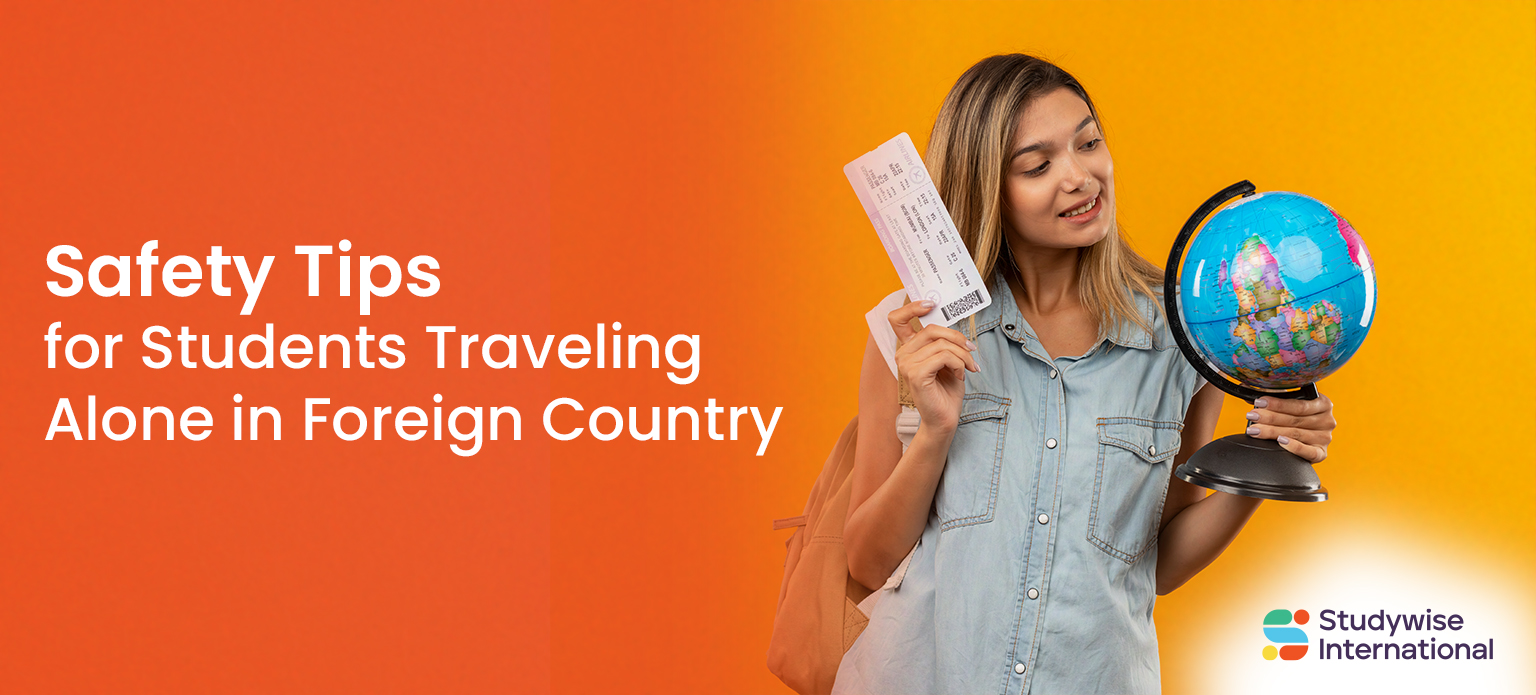
Safety Tips for Students Traveling Alone in Foreign Country
- Categories All Study in Abroad Blogs, Studying Abroad
- Date June 5, 2024
One of the many advantages of studying abroad is the ease of exploring. As an international student, you can travel in and around the city. The places you dream of seeing will be a site of every other day. Weekend sunbathing at the beach, occasional hikes, midnight parties and a thousand need places to eat at, it never gets old. At least not till the end of your course. At the same time, safety is a major concern as the students, most for the first time in their lives, are living by themselves. In such circumstances, travelling alone is not just a matter of physical safety against other beings but also discomfort and loss of direction and translation.
Most study destinations are safe for international students. As the city holds students from different cultures every year, the general population has become accustomed to them. They backed by government initiatives exhibit a safe environment for international students to grow, indulge and explore. However, the new city(s) might bring some discomfort in language, direction, choices and more. While the students may not have the possibility of being a victims of a crime, getting lost in a foreign land is equally scary. Furthermore, there could be localities where they must not go unchaperoned.
In this blog, we will discuss how students can travel alone in and around their study destination safely.
Do Your Research
Different countries and regions have their own norms, cultures and ideologies. Research on the climate, localities, dressing and current events before planning the trip. Asking a local friend would be the easiest way to do it. Regardless, Google provides great insights to figure out a plan. It is a crucial step in planning a solo trip as the destination you are travelling in, or to, can bring up unexpected scenarios. For instance, cities in Australia close their shops by 8 PM. Planning a trip post that might feel like taking a zombie walk around the city. Secondly, wearing a bodycon to Tisarana Buddhist Monastery (Canada) could be culturally inappropriate. In-depth research can not only help students plan a successful trip but can also save them from awkwardness. Furthermore, blending with the culture of your destination could enhance the experience.
Read more: Everything Students Should Know About the Australian Culture
Prepare Beforehand
Planning ahead can significantly help stay away from trouble. Students can draw a budget for the trip, or monthly trips and spend accordingly. Carry a copy of your student ID, travel and academic documents, local emergency contacts and a map in both physical and digital formats. However, carrying a lot of cash or a variety of cards might not be a great idea, unless you absolutely require them. Advance bookings and reservations can not only save money but can also secure the timeline of the trip. This means that they would not find themselves uncertain in an unfamiliar place upon arrival figuring out what to do next. From transportation to hotels and restaurants, almost everything can be booked in advance. If not, it would still be wise to enquire with them beforehand to avoid last-minute changes in plans. Also, keep your family and local friends informed of your plans.
Read more: UK Public Transport for International Students: A Guide
Maintaining Health
Bad health can ruin the experience of both you and your companions. Not only that, seeing a doctor in a new location could both be inconvenient and expensive. If you are planning a trip out of the cities, maintain good health before departure. During the trip, eat light and on time to avoid alterations in the body. That pizza looks tempting but it isn’t necessary after stuffing yourself with a plate of lasagna, and coke. Further, have water in moderation and according to the local climate. If you often get motion sickness or headaches from shifting clouds, carry a small pouch with basic medication. Carry your prescriptions, if any, and health card/insurance with you.
Read more: Maintain Mental & Physical Wellbeing while Studying Abroad
Learn the Native Language
During the trip, use the native language as much as possible with local vendors, taxi drivers, shopkeepers and others. You will find yourself talking to multiple people during your trip. Perhaps to ask the directions or suggestions on the restaurant menu. It is okay to familiarise yourself with new people, make friends or share a moment. Learn basic phrases to participate in conversations. However, stay closer to the locals in your city. They will help you explore the city like no guide ever can. You can also indulge in their festivals, traditions and food as you grow closer. Listen to their ideas and share some of yours. As needed, carry a local dictionary with you at all times.
In a public place, it will be ill-mannered to speak too loudly. But above that, it could draw unwanted attention. India or abroad, people will try to exploit you if you seem out of place. At the same time, it is your chance to romanticise your life abroad.
Read more: Overcoming Language Barriers While Studying Abroad
Keep an Open Mind
Embrace the experience as it comes. Try to keep your comfort and preferences aside and soak in the rawness of the experience you receive. It would help build memories for a lifetime. Be open to learning from your situations, even if it didn’t turn out how you expected them to be. More often than not, it becomes better than you intended. Even if it didn’t, it would be rare in its own way. Don’t visit places just to check them off your list. Slow down, take it all in. From the sunset to the fragrance of a fresh field to the blissful chirping of birds. During your interactions with others, be humble and kind. It is all a part of the experience.
Ready to start your journey to your dream study destination? Connect with Studywise International for a FREE CONSULTATION today!
You may also like

Ireland Intake 2024-25: Universities & Preparation Timeline

TOEFL Scoring System and Validity


